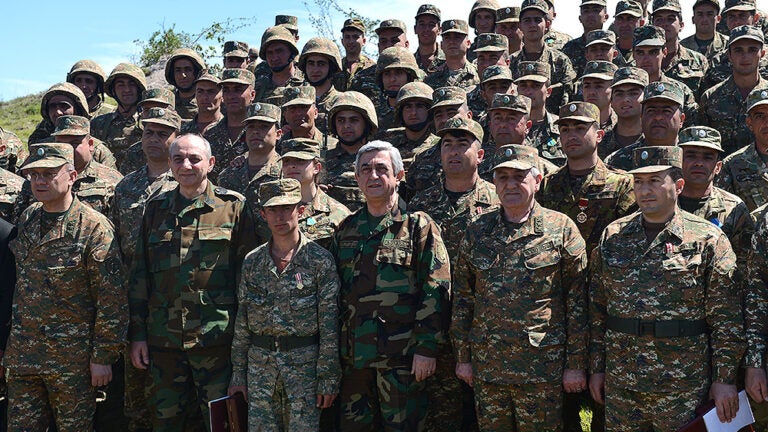
Serzh Sargsyan meets April War participants on April 19, 2016. Official photo
April War Commission Members Share Preliminary Findings
Parliamentary commission established to probe the conduct and circumstance of the April War of 2016, determined that the Armenian military forces had no shortages of ammunition, food or fuel, as was widely rumored at the time and since.
“With all responsibility I declare that there was no such thing, all [logistical supplies] were there,” the commission chair Andranik Kocharyan told CivilNet. “There was neither ammunition, food or fuel problem,” he said.
Commission member Gevorg Gorgisyan from the opposition Bright Armenia Party said that much of the media speculation around the war was not fact-based and could serve to underminine public confidence in the military, “which is unacceptable.”
“We have to stress that our soldiers and the army command fulfilled their tasks in spite of everything,” Kocharyan said, particularly new weaponry used by Azerbaijan, such as combat drones, and shortcomings in military intelligence. Shortly after the fighting, then President Serzh Sargsyan dismissed chiefs of Armenia’s military intelligence, communications and arms procurement.
While much of the inquiry is likely to remain classified, Kocharyan said they also studied Azerbaijan’s objectives and the role of third countries.
Kocharyan is a former deputy defense minister; other commission members include parliamentarians from the ruling and parliamentary opposition parties. It was established on instructions from prime minister Nikol Pashinyan, amid his political tensions with Artsakh’s and former Armenian leadership.
Over the past year, the commission collected more than 100 hours in video interviews and perused thousands of documents dealing with the fighting. Commission members met with former president Serzh Sargsyan, former defense minister Seyran Ohanyan and former Artsakh Defense Army commander Levon Mnatsakanyan, as well as junior officers and rank-and-file soldiers. Former Artsakh president Bako Sahakyan responded to the commission’s questions in writing and former foreign minister Eduard Nalbandyan testified via video from Moscow, where he now lives.
According to Kocharyan, the commission will present its report to parliamentary leadership in the fall, with a declassified summary of the report presented to the public.